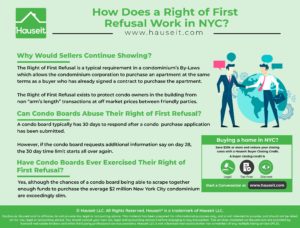A wealthy finance executive recently had a divorce with his wife. The wife was now in contract to buy a luxury condo to live in with their children. Even though it was an all cash purchase and the husband made a tremendous amount of money, the condo board wanted to be difficult because the wife had no income of her own.
As a result, they came back around 25 days after the condo application had been submitted to ask if the ex-husband could co-sign the purchase. The husband grudgingly agreed since it was for his wife and kids after all. However, after another 20 days or so the condo board came back again and asked to see the husband’s tax returns. This was egregious because the husband was well known and very wealthy, and the condo board knew the husband’s name by now. The husband was furious but ultimately agreed to share his tax returns which were several hundred pages in length.
Then after another 20 days or so the condo board asked to see if the husband could put several years of common charges into escrow. This was the last straw, the buyer’s lawyer sent in a letter threatening to sue if the board didn’t dutifully make a decision on their right of first refusal immediately.
This ultimately got the condo board to issue a waiver of their right of first refusal given the egregious nature of their conduct, and how obvious it was that they were stalling in order to frustrate the buyer, and because the condo board knew that they would most likely lose in court.
Some condo board members who pretend, either knowingly or unknowingly that they hold the power of approval like that of a co-op board, may think they can derail a prospective transaction by asking for additional information right before the typical 30 day waiver period expires, and that they’ll get another 30 days of time simply because they asked for more information.
Unfortunately for these board members hoping to deprive their fellow unit owners of their right to sell their unit freely, most condo by-laws don’t allow for such a scheme, and any such scheme would be very easy to see through and would quickly be struck down in court with damages awarded to the seller and/or buyer.
For example, here’s the language from a sample condo’s bylaws which state clearly that the board only has 30 days to consider exercising their right of first refusal, after which it is automatically waived without any opportunity to extend the review window:
If the Board or its designee shall fail to accept such offer within thirty (30) days after receipt of notice, as aforesaid, the Board shall be deemed to a have waived its right of first refusal, but such waiver shall only be effective if Common Charges through and including the date of closing of title to such Unit have been paid, and such Offeree Unit Owner may consummate the sale or lease to the Outside Offeror.
Pro Tip: If a condo board and its managing agent refused to obey the condo bylaws and issue a waiver in order to scuttle a deal, then not only will the board and managing agent have violated its fiduciary duty to carry out its duties per the by-laws, which includes freely allowing unit owners to sell their properties, but they would devastate re-sale prices for all owners once it becomes known that the building has a rogue condo board that thinks it’s a co-op board.










Here is a sample right of first refusal letter my friend received. Curious if I should be expecting more than just this, which is basically a paragraph or so?
July 9, 2020
Norman Jones
115 Arthur Avenue
Brooklyn, New York 24213
Dear Unit Owner(s):
Please be advised that the Board of Managers of the Arthur Avenue Condominium does not wish to purchase: 115 Arthur Avenue, Unit 3C and you are free to sell it to:
Jonathan Smith
However, this sale is subject to the terms of the Deed and By-Laws of the Arthur Avenue Condominium. The foregoing permission is subject to the condition that the Condominium receives a copy of the Deed of Conveyance as soon as possible after the date of closing and payment in full at the closing of all common and other outstanding charges. This letter is valid only for the purchaser(s) named above and on the Contract of Sale. If the closing does not take place within forty-five (45) days from the above date, you must request a new letter of First Refusal.
Sincerely,
CONDOMINIUM BOARD OF MANAGERS
Jessica Alba
President